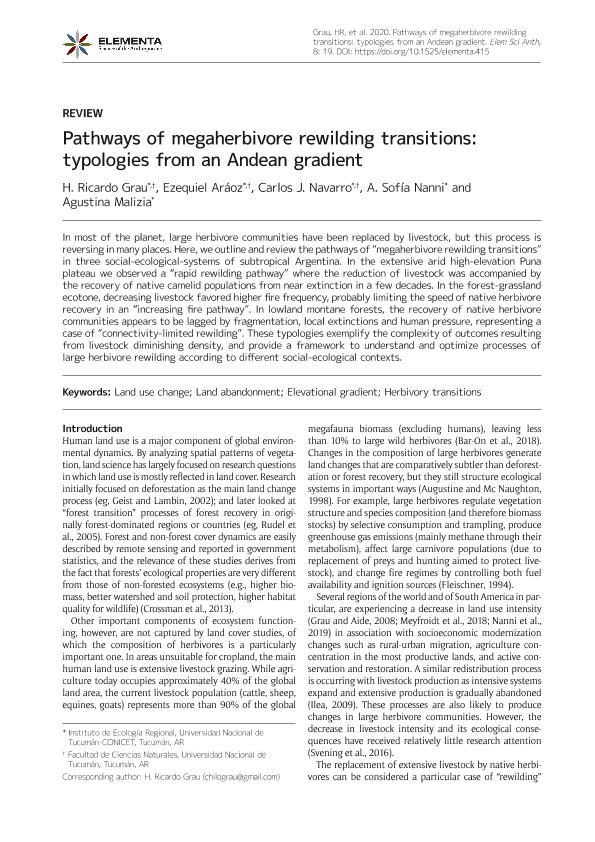Mostrar el registro sencillo del ítem
dc.contributor.author
Grau, Hector Ricardo

dc.contributor.author
Aráoz, Ezequiel

dc.contributor.author
Navarro, Carlos Javier

dc.contributor.author
Nanni, Ana Sofía

dc.contributor.author
Malizia, Agustina

dc.date.available
2021-11-17T15:56:59Z
dc.date.issued
2020-05
dc.identifier.citation
Grau, Hector Ricardo; Aráoz, Ezequiel; Navarro, Carlos Javier; Nanni, Ana Sofía; Malizia, Agustina; Pathways of megaherbivore rewilding transitions: Typologies from an Andean gradient; University of California Press; Elementa; 8; 1; 5-2020; 1-12
dc.identifier.issn
2325-1026
dc.identifier.uri
http://hdl.handle.net/11336/147062
dc.description.abstract
In most of the planet, large herbivore communities have been replaced by livestock, but this process is reversing in many places. Here, we outline and review the pathways of "megaherbivore rewilding transitions"in three social-ecological-systems of subtropical Argentina. In the extensive arid high-elevation Puna plateau we observed a "rapid rewilding pathway"where the reduction of livestock was accompanied by the recovery of native camelid populations from near extinction in a few decades. In the forest-grassland ecotone, decreasing livestock favored higher fire frequency, probably limiting the speed of native herbivore recovery in an "increasing fire pathway". In lowland montane forests, the recovery of native herbivore communities appears to be lagged by fragmentation, local extinctions and human pressure, representing a case of "connectivity-limited rewilding". These typologies exemplify the complexity of outcomes resulting from livestock diminishing density, and provide a framework to understand and optimize processes of large herbivore rewilding according to different social-ecological contexts.
dc.format
application/pdf
dc.language.iso
eng
dc.publisher
University of California Press
dc.rights
info:eu-repo/semantics/openAccess
dc.rights.uri
https://creativecommons.org/licenses/by-nc-sa/2.5/ar/
dc.subject
ELEVATIONAL GRADIENT
dc.subject
HERBIVORY TRANSITIONS
dc.subject
LAND ABANDONMENT
dc.subject
LAND USE CHANGE
dc.subject.classification
Ecología

dc.subject.classification
Ciencias Biológicas

dc.subject.classification
CIENCIAS NATURALES Y EXACTAS

dc.subject.classification
Geografía Física

dc.subject.classification
Ciencias de la Tierra y relacionadas con el Medio Ambiente

dc.subject.classification
CIENCIAS NATURALES Y EXACTAS

dc.title
Pathways of megaherbivore rewilding transitions: Typologies from an Andean gradient
dc.type
info:eu-repo/semantics/article
dc.type
info:ar-repo/semantics/artículo
dc.type
info:eu-repo/semantics/publishedVersion
dc.date.updated
2021-09-07T14:32:23Z
dc.journal.volume
8
dc.journal.number
1
dc.journal.pagination
1-12
dc.journal.pais
Estados Unidos

dc.journal.ciudad
Los Angeles
dc.description.fil
Fil: Grau, Hector Ricardo. Universidad Nacional de Tucumán. Instituto de Ecología Regional. Consejo Nacional de Investigaciones Científicas y Técnicas. Centro Científico Tecnológico Conicet - Tucumán. Instituto de Ecología Regional; Argentina
dc.description.fil
Fil: Aráoz, Ezequiel. Universidad Nacional de Tucumán. Instituto de Ecología Regional. Consejo Nacional de Investigaciones Científicas y Técnicas. Centro Científico Tecnológico Conicet - Tucumán. Instituto de Ecología Regional; Argentina
dc.description.fil
Fil: Navarro, Carlos Javier. Universidad Nacional de Tucumán. Instituto de Ecología Regional. Consejo Nacional de Investigaciones Científicas y Técnicas. Centro Científico Tecnológico Conicet - Tucumán. Instituto de Ecología Regional; Argentina
dc.description.fil
Fil: Nanni, Ana Sofía. Universidad Nacional de Tucumán. Instituto de Ecología Regional. Consejo Nacional de Investigaciones Científicas y Técnicas. Centro Científico Tecnológico Conicet - Tucumán. Instituto de Ecología Regional; Argentina
dc.description.fil
Fil: Malizia, Agustina. Universidad Nacional de Tucumán. Instituto de Ecología Regional. Consejo Nacional de Investigaciones Científicas y Técnicas. Centro Científico Tecnológico Conicet - Tucumán. Instituto de Ecología Regional; Argentina
dc.journal.title
Elementa
dc.relation.alternativeid
info:eu-repo/semantics/altIdentifier/doi/https://doi.org/10.1525/elementa.415
dc.relation.alternativeid
info:eu-repo/semantics/altIdentifier/url/https://online.ucpress.edu/elementa/article/doi/10.1525/elementa.415/112767/Pathways-of-megaherbivore-rewilding-transitions
Archivos asociados
